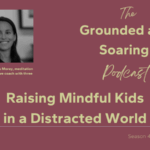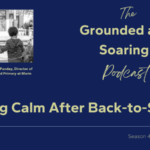Why Hands-On Projects Matter: A Student’s Perspective
In an era where almost everything people do is online…
In an era where almost everything people do is online…
Most of the time, when a parent mentions that some undesirable behavior is going on with their young child, it has something to do with one of the child’s three basic physical needs, and if they are met and stable, or not. These are sleeping, eating, and eliminating – and chief among them is sleep.
We all need help committing to the long view as we parent; it’s easy to let anxiety and social comparison hijack our highest ideals and goals for our children. Enter Jessica Lahey, author of the New York Times bestselling book, The Gift of Failure: How the Best Parents Learn to Let Go So Their Children Can Succeed. In this podcast episode, Sam Shapiro, Head of Marin Montessori School, speaks with Jessica about her top suggestions for parents for helping their kids develop robust independence, inner motivation to learn, and self-possession.
Key topics in the podcast include:
* A helpful parenting hack in the form of a question that will guide us when we’re deciding whether to step in to take over for our child
* The value of focusing on process over product, especially for anxious kids
* The difference between competence and confidence
* The counterbalance parents can provide to the more harmful messages our children receive about the source of their worth
* The value of strengths-based parenting
The U.S. Department of Labor’s prediction that 65 percent of our children’s careers haven’t been invented yet seems even more relevant today: What will the world be like when our children step into it as adults?
We’re living in the middle of the revolution that has reshaped our world. In this episode, Tom Preston-Werner, MMS parent and founder and former CEO of GitHub, joins for a wide-ranging conversation about the role technology plays in modern life, what we should do about exposing our kids to it, and how we should go about preparing them to be agile, creators, not passive consumers. Parents sometimes wonder whether they’re disadvantaging future coders by sending them to a low-tech school. Tom’s answer might surprise you.
A few years before his cancer diagnosis, we had a birthday party to celebrate Perry, my dad. I had a moment of awe and admiration for the joyful, fulfilling life he had created and reached. I raised a glass and said to him, “Here’s to you, Pop. Congratulations on making your dreams into reality.” Without missing a beat as he raised his glass to his lips, he said, “Better to make your reality your dreams.”
In this episode, we dive into a topic that most parents wrestle with because it’s essential and really, really hard. Communication or perhaps more accurately – healthy communication – is critical for a human being at any age to express feelings, preferences, needs and to receive those messages from others. The question is how do we as parents help our kids build strong communication skills? – always a challenge but never more so than in today’s digital world. Siri Panday, Director of Education for Toddler and Primary at Marin Montessori School, joins to share her insights and a few helpful tips for parents.
We’re all scientists before we’re science students. When their natural curiosity is not cultivated, though, they can lose interest in the scientific principles that allow them to see their world differently.
It’s not their fault, of course.
This fall, David Brooks published an essay in The New York Times called “The Crisis of Boys and Men.” Among his provocative arguments based on some pretty sobering data points: “Many men are like what Dean Acheson said about Britain after World War II. They have lost an empire but not yet found a role.”
When it comes to raising healthy boys today, parents and educators alike are called to wrestle with some troubling and uncomfortable byproducts of seismic shifts in our culture, economy, and society. The news isn’t all bad, though, because parents and schools can do a lot to meet the needs of boys.
To paint a picture of the issue and the way forward, we spoke with Dr. Warren Farrell, author of The Boy Crisis: Why our Sons are Struggling–and What We Can Do About It. It’s a complex and worthy topic. Just a note that this episode addresses some adult topics, so it may be best to listen without the kids in the car.
Storytelling is in our DNA. As human beings, we evolved to tell stories as a way to convey emotion and share information. Storytelling is how we educate and entertain. It’s how we learn about our world and find meaning in it. More than anything, storytelling is how we connect with one another.


